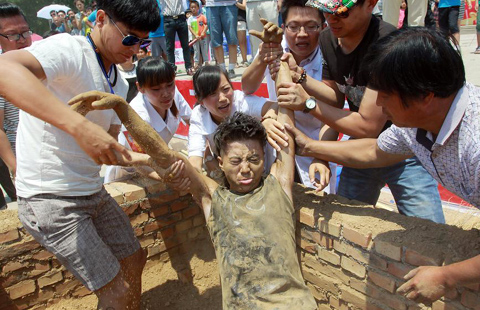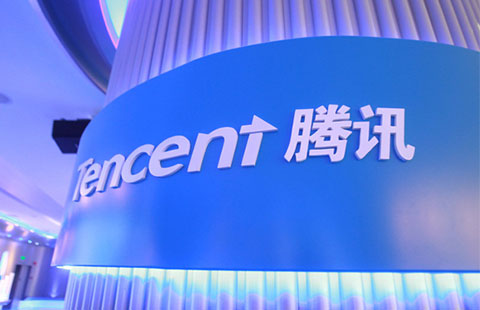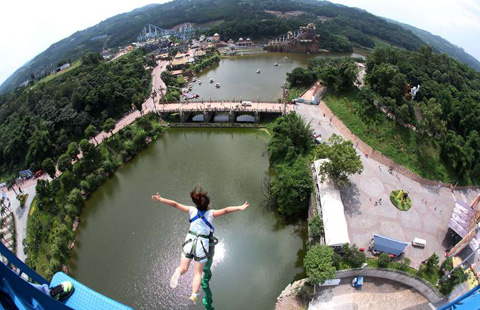What's after WikiLeaks revelations of NSA spying on Paris?
Updated: 2015-06-25 10:24
(Xinhua)
|
||||||||
PARIS - Will alleged spying against France's leaders and main officials twist a knife in the diplomatic ties linking Paris and Washington? Or, will both allies turn blind eyes to the eventual row to carry out their missions mainly in Iraq and Eastern Europe and honor their commitment overseas?
In a press statement published on Tuesday, WikiLeaks said the National Security Agency (NSA) of the United States spied French high-level officials, including French president Francois Hollande, ex-presidents Nicolas Sarkozy and Jacques Chirac, and French cabinet ministers between 2006 and 2012.
According to WikiLeaks, the documents are intelligence summaries of conversations between French government officials concerning some of the most pressing issues facing France and the international community, including a dispute between the French and US governments over US spying on France.
"France will not tolerate actions that threaten its security and the protection of its interests," French President Francois Hollande stressed after holding a defense council "to evaluate the nature" of the revealed reports.
Hollande denounced "unacceptable" the spying, calling on Washington to respect "a code of conduct" that imposed new rules on spying following reports published in 2013 that the United States tapped German Chancellor Angela Merkel's mobile phone and snooped on millions of French telephone calls.
Facing the National Assembly, French Prime Minister Manuel Valls asked the United States to repair the damage that the tapping has caused.
"The US must recognize not only the dangers such actions pose to our liberties, but also do everything, and quickly, to repair the damage it causes to the relations between allied countries and between France and the United States," Valls said Wednesday.
"The reported spying creates a discomfort, because there is a breach of trust. But, it is absolutely important and vital for both countries to maintain their partnership, given that there are many sensitive issues such as Ukraine, operations in Iraq which remained unsolved," Ulysse Gosset, journalist specialized in foreign politics told news channel BFMTV.
To Edwy Plenel, French political journalist and editor-in-chief of news website Mediapart, which reported WikiLeaks revelations, it is "a real problem of loyalty in international relations between allies".
French Foreign Minister Laurent Fabius summoned US ambassador Jane Hartley for an explanation on "Espionage Elysee" of WikiLeaks.
Urging a strong answer to United States' spying on Paris, critics from the right and left wing parties called for retaliation. But, according to the ruling Socialists, a diplomatic spat is not in the air.
"In the face of threats that we face and given the historic ties linking us, we have to keep a perspective. We're not going to break diplomatic ties," said Stephane Le Foll, the government's spokesman after a weekly cabinet meeting.
Following the allegations of US spying on French interests, which had emerged for the second time in two years, Le Foll announced a senior French intelligence official would be dispatched to the United States "to verify this spying has finished."
"Between allies, this is unacceptable and incomprehensible. France does not spy on its allies," he stressed.
A statement from the US National Security Council said it was not targeting and would not target Hollande's communications, but did confirm that spying had taken place in the past.
However, after a phone discussion between French president Francois Hollande and his American counterpart Barack Obama, Elysee seemed much calmer but hazy.
"President Obama reiterated unequivocally his firm commitment to end the practices that were allowed to happen in the past and that were unacceptable among allies," said the statement of the Elysee, without clarifying France's reaction after the phone discussion.
But "the French intelligence officials will travel soon to Washington to deepen the cooperation", according to the statement.
In 2013, Hollande and German Chancellor Angela Merkel set "a code of conduct" for Washington that imposes new rules on spying following reports published that the United States tapped German leader's mobile phone and snooped on millions of French telephone call.
France is a close ally of the United States, and plays a key role in a number of US-associated international institutions, including the Group of 7 and NATO.
- Heat wave kills 748 people in Pakistan's Karachi
- S. Korea protests DPRK's sentencing of 2 detainees
- Myanmar's new ceasefire talks likely to be held in Thailand
- Earthquake-stricken Nepal all set to host reconstruction conference
- The world in photos: June 15-21
- Polish airline, hit by cyber attack, says all carriers are at risk

 Across Canada(June 26)
Across Canada(June 26)
 Turning metal waste into robot-like artwork
Turning metal waste into robot-like artwork
 Man breaks record for being buried alive
Man breaks record for being buried alive
 Ten photos you don't wanna miss - June 24
Ten photos you don't wanna miss - June 24
 Three ships stranded as tropical storm Kujira hits S China
Three ships stranded as tropical storm Kujira hits S China
 Top 10 most valuable Chinese brands of 2015
Top 10 most valuable Chinese brands of 2015
 Ten photos you don't wanna miss - June 23
Ten photos you don't wanna miss - June 23
 The world in photos: June 15-21
The world in photos: June 15-21
Most Viewed
Editor's Picks

|

|

|

|

|

|
Today's Top News
Xi: Bilateral ties should be kept on course
Chinese, US leaders meet with CEOs
Kerry praises US-China on
climate efforts
Liu calls for more 'she power'
Vice-premier calls for more 'she power'
US spied on French presidents, officials, reveals Wikileaks
Australia commits $718m for China-initiated bank
BOC denies illegal activity in Italy
US Weekly

|

|






